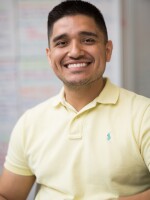Austin Public Health’s interim authority said he’s “extremely impressed with the efficacy and safety” of the Pfizer and BioNTech COVID-19 vaccine.
The vaccine’s overall efficacy is 94.6%, Dr. Mark Escott said during a news conference Wednesday, and for people between the ages of 16 and 55 the rate is 95%. He said the effectiveness was “much better than anyone expected it to be.”
There are side effects, particularly from the second shot of the vaccine, but Escott said they are the same ones experienced with other immunizations: chills, swelling and muscle aches.
An advisory committee from the Food and Drug Administration will meet Thursday to discuss authorizing the vaccine in the U.S.
“I think we’re likely to see the FDA authorizing, under emergency use authorization, this vaccine after the hearing tomorrow,” Escott said.
Cassandra DeLeon, interim APH assistant director, said Austin and Travis County will receive more than 13,000 doses of the vaccine as early as next week if it is approved.
“So we are planning, as that vaccine comes into the community next week, to anticipate that we’ll see vaccinations starting,” DeLeon said.
Escott said the primary goal is to protect the hospital and health care infrastructures.
“We don’t have enough doses to do that yet,” he said.
Over the last 10 days, Travis County has averaged about 300 new coronavirus cases a day. Janet Pichette, APH’s chief epidemiologist, said the area is “definitely seeing the direct impact of the Thanksgiving holiday.”
“We are hearing story after story after story about families who gathered,” she said, “and now multiple people are becoming ill with COVID-19.”
Despite repeated pleas from health officials not to gather, the Austin American-Statesman reported last week that Austin Mayor Steve Adler hosted a 20-person wedding for his daughter in early November and then flew to Mexico with a group of people.
Escott said he didn’t have specific conversations with the mayor regarding the trip, but said stage 3 risk guidelines in place at the time “did not include avoiding travel” for lower-risk individuals.
“Had the mayor asked me, I would have said that our guidance says that it’s OK if the people who are traveling fall into that lower-risk category,” Escott said. “Obviously, things have changed significantly since the beginning of November. That guidance now would include avoid[ing] those kinds of trips. So from a public health standpoint, it was not inconsistent with the guidance at the time.”
The area moved to stage 4 risk guidelines on Nov. 19. At this stage, the public is asked to avoid gatherings of more than 10 people.
Despite the backlash Adler received for his decision, Escott said he was “grateful, particularly to the mayor’s daughter,” for adjusting plans and keeping the wedding small.
This story has been updated.
Got a tip? Email Jerry Quijano at jerry@kut.org. Follow him on Twitter @jerryquijano.
If you found the reporting above valuable, please consider making a donation to support it. Your gift pays for everything you find on KUT.org. Thanks for donating today.






